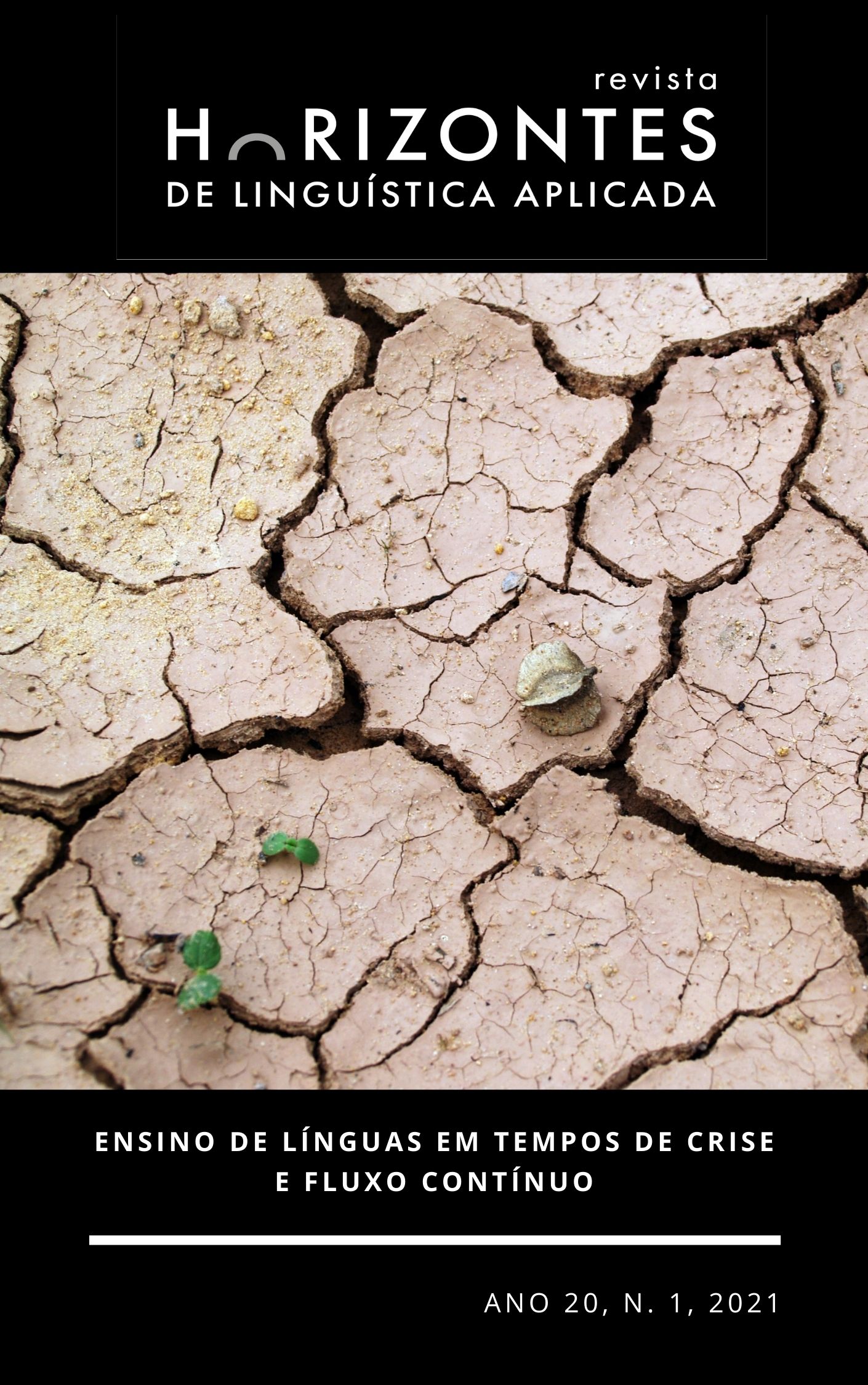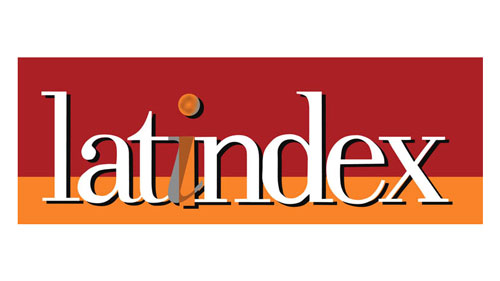Crosslinguistic influence in the production of English as L3
DOI :
https://doi.org/10.26512/rhla.v20i1.32893Mots-clés :
crosslinguistic influence, multilingualism, cognatesRésumé
Crosslinguistic influence (CLI) refers to the phenomenon of how one language affects the acquisition and processing of another language by the same speaker. Bilinguals and multilinguals offer a good opportunity to study crosslinguistic phenomena since they have multiple language systems in interaction. Here we report the results of a study which investigated CLI in bilinguals and trilinguals. The objective of the study was twofold: (1) to analyze the influence of cognate words in the oral production of L2 and L3 English speakers in terms of quantity and type of cognates (English-Portuguese, English-German, English-German-Portuguese); (2) to investigate CLI in the production of English as L3. Participants were required to narrate a story on the basis of four pictures. The analysis of the narratives showed that bilinguals and trilinguals produced a similar number of cognate words of the type English- Portuguese and English- German- Portuguese. Regarding the cognate type English- German, trilinguals produced a significant higher number of these words as compared to the bilinguals. Since the bilinguals had no knowledge of German, these results indicate that the L2 (German) of the trilinguals facilitated the production of English-German cognates. We interpret these results as evidence of the coactivation of the trilinguals’ languages.
Téléchargements
Références
BARDEL, C.; FALK, Y. The role of the second language in third language acquisition: The case of Germanic syntax. Second Language Research, v. 23, n. 4, p. 459-484, 2007.
BAYONA, P. The acquisition of Spanish middle and impersonal passive construction from SLA and TLA perspectives. In: LEUNG, Y. I. (Org.); Third language acquisition and universal grammar. Bristol (UK): Multilingual Matters, 2009, p. 01-29.
CARVALHO, A. M.; SILVA, A. J. B. Cross-linguistic influence in third language acquisition: the case of Spanish-English bilinguals` acquisition of Portuguese. Foreign Language Annals, v.39, n.2, p. 185-202, 2006.
CENOZ, J. The effects of linguistic distance, L2 status and age on cross-linguistic influence in third language acquisition. In: CENOZ, J., HUFEISEN, B.; JESSNER, U. (Orgs.), Cross-linguistic influence in third language acquisition: psycholinguistic perspectives. Clevedon: Multilingual Matters, 2001, p. 8-20.
CHIN, D. H. Language transfer in the acquisition of the semantic contrast in L3 Spanish. In: LEUNG, Y. I. (Ed.); Third language acquisition and universal grammar. Bristol (UK): Multilingual Matters, 2009, p. 30-54.
DIJKSTA, T. Lexical processing in bilinguals and multilinguals. In: CENOZ, J., HUFEISEN, B.; JESSNER, U. (Orgs.). The multilingual lexicon. New York: Kluwer Academic Publishers, 2003, p 11-26.
DIJKSTRA, T.; VAN HEUVEN, W. J. B. The architecture of the bilingual word recognition system: from identification to decision. Bilingualism: Language and Cognition, v. 5, n. 3, p. 175-197, 2002.
ECKE, P. Lexical retrieval in a third language: evidence from errors and tip-of-the-tongue states. In: CENOZ, J., HUFEISEN, B.; JESSNER, U. (Orgs.). Cross-linguistic influence in third language acquisition: psycholinguistic perspectives. Clevedon: Multilingual Matters, 2001, p. 90-114.
FALK, Y.; BARDEL, C. Object pronouns in German L3 syntax: evidence for the L2 status factor. Second Language Research, v.27, n.1, p. 59- 82, 2011.
FLYNN, S. UG and L3 Acquisition: new insights and more questions. In: LEUNG, Y. I. (Org.). Third language acquisition and universal grammar. Bristol (UK): Multilingual Matters, 2009, p. 71-88.
FOOTE, R. Transfer in L3 Acquisition: The role of typology. In: LEUNG, Y. I. (Org.). Third language acquisition and universal grammar. Bristol (UK): Multilingual Matters, 2009, p. 89-114.
FOUSER, F. J. Too close for comfort? Sociolinguistic transfer from Japanese into Korean as an L3. In: CENOZ, J., HUFEISEN, B.; JESSNER, U. (Orgs.). Cross-linguistic influence in third language acquisition: psycholinguistic perspectives. Clevedon: Multilingual Matters, 2001, p. 149-169.
HOPP, H. Cross-linguistic influence in the child third language acquisition of grammar: Sentence comprehension and production among Turkish-German and German learners of English. International Journal of Bilingualism, v. 23, n.2, p. 567-583, 2019.
JIN, F. Third language acquisition of Norwegian objects: interlanguage transfer or L1 influence? In: LEUNG, Y. I. (Org.). Third language acquisition and universal grammar. Bristol (UK): Multilingual Matters, 2009, p. 144-161.
KROLL, J. F.; STEWART, E. Category interference in translation and picture naming: Evidence for asymmetric connections between bilingual memory representations. Journal of memory and language, v.33, n.2, p.149-174, 1994.
LAUFER, B.; NATION, P. A vocabulary-size test of controlled productive ability. Language testing, v. 16, n.1, p.33-51, 1999.
LEMHÖFER, K.; DIJKSTRA, T.; MICHEL, M. Three languages, one ECHO: Cognate effects in trilingual word recognition. Language and Cognitive Processes, v.19, n.5, p. 585-611, 2004.
LLAMA, R.; CARDOSO, W.; COLLINS, L. The roles of typology and L2 status in the acquisition of L3 phonology: the influence of previously learnt languages on L3 speech production. Proceedings of the Fifth International Symposium on the Acquisition of Second Language Speech, p. 313-323, 2007.
MAYER, M. Frog, where are you? New York: Dial Press, 1969.
MONTRUL, S.; DIAS, R.; SANTOS, H. Clitics and object expression in the L3 acquisition of Brazilian Portuguese: structural similarity matters for transfer. Second Language Research, v. 27, n.1, p. 21- 58, 2011.
ORTIN, R.; FERNANDEZ-FLOREZA, C. Transfer of variable grammars in third language acquisition. International Journal of Multilingualism, v.16, n.4, p. 442-458, 2018.
POARCH, G. J.; VAN HELL, J. G. Cross-language activation in children’s speech production: Evidence from second language learners, bilinguals, and trilinguals. Journal of experimental child psychology, v. 111, n.3, p.419-438, 2012.
RANONG, S. N.; LEUNG, Y. I. Null objects in L1 Thai-L2 English-L3 Chinese: An empiricist take on a theoretical problem. In: LEUNG, Y. I. (Org.). Third language acquisition and universal grammar. Bristol (UK): Multilingual Matters, 2009, p. 162-191.
RINGBOM, H. Lexical transfer in L3 production. In: CENOZ, J., HUFEISEN, B.; JESSNER, U. (Orgs.). Cross-linguistic influence in third language acquisition: psycholinguistic perspectives. Clevedon: Multilingual Matters, 2001, p. 59-68.
ROTHMAN, J.; AMARO, J. C. What variables condition syntactic transfer? A look at the L3 initial state. Second Language Research, v.26, n.2, p.189- 218, 2010.
ROTHMAN, J. L3 syntactic transfer selectivity and typological determinacy: the typological primacy model. Second Language Research, v.27, n.1, p.107- 127, 2011.
SÁNCHEZ, L. An Inquiry into the Role of L3 Proficiency on Crosslinguistic influence in Third Language Acquisition. ODISEA. Revista de estudios ingleses, v.15, p.169-188, 2017.
SHOOSHTARI, Z. G. Generative Syntactic Transfer in L2 and L3 acquisition via the channel of translation. English Language Teaching, v.2, n.1, p.129- 149, 2009.
SILVA, M. C. C.; HÜBNER, L. C. Aprendizagem da Língua Inglesa como terceira língua (L3) por aprendizes surdos brasileiros: investigando a transferência léxico- semântica entre línguas de modalidades diferentes. Veredas-Revista de Estudos Linguísticos, v.19, n.2, p.34-48, 2015.
TOASSI, P. F. P. Crosslinguistic influences in the acquisition of English as a third language: an investigation. 2012. 150f. Dissertação (Mestrado em Letras Inglês e Literatura Correspondente). Universidade Federal de Santa Catarina, Florianópolis, 2012.
TOASSI, P. F. P. Investigating lexical access in multilinguals: a study on the processing of English as L3. 2016. 252 f. Tese (Doutorado em Inglês: Estudos Linguísticos e Literários). Universidade Federal de Santa Catarina, Florianópolis, 2016.
TOASSI, P. F. P.; MOTA, M. B. A aprendizagem lexical do inglês como terceira língua: um estudo com foco em influências translinguísticas. Entretextos (UEL), v.13, p.12 – 32, 2013a. Disponível em: http://dx.doi.org/10.5433/1519-5392.2013v13n2p.
TOASSI, P. F. P.; MOTA, M. B. Transferência linguística no nível sintático na produção do inglês como terceira língua. Nonada: letras em revista, v.2, n. 21, 2013b. Disponível em: https://seer.uniritter.edu.br/index.php?journal=nonada&page=article&op=view&path%5B%5D=801
TOASSI, P. F. P.; MOTA, M. B. English as a third language in the Brazilian context: an investigation on crosslinguistic influences. Revista Signótica, v.26, n.2, p.557 – 578, 2014. Disponível em: https://www.revistas.ufg.br/sig/article/view/27564/17671.
TOASSI, P. F. P; MOTA, M. B. Acesso lexical de bilíngues e multilíngues. Acta Scientiarum. Language and Culture (Online), v.37, p.393 – 404, 2015. Disponível em: https://doi.org/10.4025/actascilangcult.v37i4.25234.
TOASSI, P. F. P; MOTA, M., B. Semantic priming effects and lexical access in English as L3. Gragoatá (UFF), v.23, n.46, p.354 – 373, 2018. Disponível em: https://doi.org/10.22409/gragoata.v23i46.33581.
TOASSI, P.F.P; MOTA, M.B.; TEIXEIRA, E. N. The effect of cognate words on lexical access in English as a third language. Cadernos de Tradução, v. 40, no. esp. 2, p. 74-96, 2020. Disponível em: https://doi.org/10.5007/2175-7968.2020v40nesp2p74.
WESTERGAARD, M. et al. Crosslinguistic influence in the acquisition of a third language: the Linguistic Proximity Model. International Journal of Bilingualism, v. 21, n. 6, p. 666- 682, 2017.
YOUNES, S. A.; GATHERCOLE, V. C. M. Phonological interaction in Spanish-English bilinguals: effects of cognate usage on voice onset time of voiced stops. International Journal of Bilingual Education and Bilingualism, p. 1-19, 2020. DOI: 10.1080/13670050.2020.1715914.
Téléchargements
Publié-e
Comment citer
Numéro
Rubrique
Licence
(c) Tous droits réservés Revista Horizontes de Linguistica Aplicada 2021

Cette œuvre est sous licence Creative Commons Attribution - Pas d'Utilisation Commerciale - Pas de Modification 4.0 International.

A Revista Horizontes de Linguística Aplicada de http://seer.bce.unb.br/index.php/horizontesla/index é licenciado sob uma Licença Creative Commons Atribuição-Uso não-comercial-Vedada a criação de obras derivadas 3.0 Unported.
- Autores mantém os direitos autorais e concedem à revista o direito de primeira publicação, sendo o trabalho simultaneamente licenciado sob a Creative Commons Attribution License o que permite o compartilhamento do trabalho com reconhecimento da autoria do trabalho e publicação inicial nesta revista.
- Autores têm autorização para assumir contratos adicionais separadamente, para distribuição não-exclusiva da versão do trabalho publicada nesta revista (ex.: publicar em repositório institucional ou como capítulo de livro), com reconhecimento de autoria e publicação inicial nesta revista.





